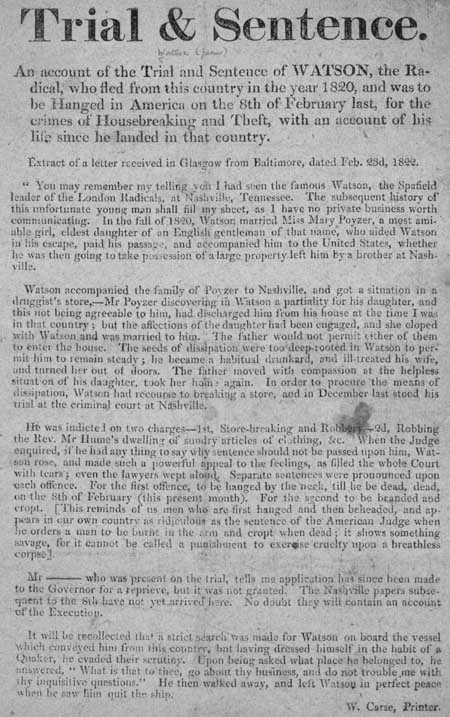Transcription
Trial & Sentence. An account of the Trial and Sentence of WATSON, the Ra-
dical, who fled from this country in the year 1820, and was to
be Hanged in America on the 8th of February last, for the
crimes of Housebreaking and Theft, with an account of his
life since he landed in that country. Extract of a letter received in Glasgow from Baltimore, dated Feb. 23d, 1822. " You may remember my telling you I had seen the famous Watson, the Spafield
leader of the London Radicals, at Nashville, Tennessee. The subsequent history of
this unfortunate young man shall fill my sheet, as I have no private business worth
communicating. In the fall of 1820, Watson married Miss Mary Poyzer, a most ami-
able girl, eldest daughter of an English gentleman of that name, who aided Watson
in his escape, paid his passage, and accompanied him to the United States, whether
he was then going to take possession of a large property left him by a brother at Nash-
ville. Watson accompanied the family of Poyzer to Nashville, and got a situation in a
druggist's store,?Mr Poyzer discovering in Watson a partiality for his daughter, and
this not being agreeable to him, had discharged him from his house at the time I was
in that country ; but the affections of the daughter had been engaged, and she eloped
with Watson and was married to him. The father would not permit either of them
to enter the house. The seeds of dissipation were too deep-rooted in Watson to per-
mit him to remain steady ; he became a habitual drunkard, and ill-treated his wife,
and turned her out of doors. The father moved with compassion at the helpless
situation of his daughter, took her home again. In order to procure the means of
dissipation, Watson had recourse to breaking a store, and in December last stood his
trial at the criminal court at Nashville. He was indicted on two charges?1st, Store-breaking and Robbing,__2d, Robbing
the Rev. Mr Hume's dwelling of sundry articles of clothing, &c. When the Judge
enquired, if he had any thing to say why sentence should not be passed upon him, Wat-
son rose, and made such a powerful appeal to the feelings, as filled the whole Court
with tears; even the lawyers wept aloud Separate sentences were pronounced upon
each offence. For the first offence, to be hanged by the neck, till he be dead, dead,
on the 8th of February (this present month). For the second to be branded and
cropt. [This reminds of us men who are first hanged and then beheaded, and ap-
pears in our own country as ridiculous as the sentence of the American Judge when
he orders a man to be burnt in the arm and cropt when dead ; it shows something
savage, for it cannot be called a punishment to exercise cruelty upon a breathless
corpse]. Mr ?? who was present on the trial, tells me application has since been made
to the Governor for a reprieve, but it was not granted. The Nashville papers subse-
quent to the 8th have not. yet arrived here. No doubt they will contain an account
of the Execution. It will be recollected that a strict search was made for Watson on board the vessel
which conveyed him from this country, but having dressed himself,in the habit of a
Quaker, he evaded their scrutiny. Upon being asked what place he belonged to, he
answered, " What, is that to thee, go about thy business, and do not trouble me with
thy inquisitive questions." He then walked away, and left Watson in perfect peace
when he saw him quit the ship. W. Carse, Printer.
View Commentary | Download PDF Facsimile
|
 |
Date of publication:
1822 shelfmark: L.C.Fol.73(027)
 View larger image
View larger image
|


